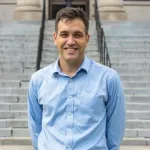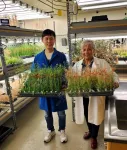(Press-News.org) A tiny fraction of schools in England – about three in every 500 – have whole-school policies which address foreign languages, English usage, and integrating students who speak English as an additional language (EAL), new research indicates.
The study of almost 1,000 secondary schools, by researchers at the University of Cambridge, questions many schools’ claims to being ‘inclusive’ spaces that value the linguistic diversity of their communities. It also suggests that language learning, and an appreciation of different languages, is being deprioritised, conflicting with Government ambitions for 90% of students to study a language to GCSE by 2025.
Schools in England are increasingly multicultural. Around 20% of students qualify as EAL, meaning they typically speak a different language at home. The study examined how schools navigate various issues this raises relating to languages: including students’ use and acquisition of English; the status of modern languages in the curriculum; and schools’ attitudes towards home and community languages.
The researchers reviewed every publicly available policy document from the websites of 998 secondary schools (about 20% of all those in England). Only six published dedicated school-wide policies on languages. More schools had official policies on asbestos management, or whether dogs were allowed on school grounds.
While most schools did have some specific language-related policies, these were often isolated, unclear and inconsistent; particularly on key issues such as supporting EAL learners, or the status of community languages like Polish and Urdu. Over a third (37%) failed to mention English, other languages, or even the term ‘language’ in any public policy document.
Writing in the British Educational Research Journal, the authors suggest that the absence of joined-up language strategies could pose particular challenges for England’s 1.7 million EAL students. Only 6% of state schools, and 15% of schools overall, had explicit EAL policies.
They also encountered anecdotal evidence that some EAL students’ experiences are disjointed as a result. One student, who had recently moved to the UK from Poland, described being told off for speaking Polish in one lesson when asking a friend for help, before receiving learning resources translated into Polish in her next class.
Karen Forbes, Associate Professor in Second Language Education at the University of Cambridge, said: “It’s surprising that so few schools seem to have systematic policies concerning language education and language use.”
“A major reason is probably is that school leaders just don’t have time to devise a unified approach on linguistic diversity. But language is fundamental to how students learn, conceptualise ideas, and process information. The absence of clear policies is very worrying, especially for EAL students.”
Although one in 10 state schools in the sample had EAL student populations exceeding 40% of the total, most only mentioned languages in passing, and usually within broader policies. In 33 schools, EAL was explicitly categorised as a “special educational need”, contradicting the Government’s own code of practice on special educational needs and disabilities.
Most policies on English reinforced national guidance requiring students to learn ‘standard English’ across the curriculum. Surprisingly, however, some extended this beyond the classroom. One school expected parents to “explain when their child should use Standard English appropriately at home”; which, the study notes, non-English-speaking parents would find challenging. Seven schools banned other languages completely, including at breaktimes, with one going so far as to state that: “students should be reprimanded for speaking other languages”.
These policies often appear to clash with schools’ public claims that they celebrate cultural and linguistic diversity. Forbes said that they could also hinder learning, especially in subjects that involve specialised language and terminology, which EAL students might grasp more quickly if they were allowed to translate them.
“Prohibiting students from even using their home language to talk to their friends at breaktime can seriously undermine a student’s sense of belonging and whether they feel valued,” she added.
The study also raises concerns about how far language learning and multilingualism are encouraged within the curriculum.
While modern foreign languages are mandatory to Key Stage 3 (age 14), the Government encourages their study to GCSE through the English Baccalaureate. About 65% of independent schools in the sample regarded language study to GCSE as compulsory, but just a quarter of state schools “required” or “encouraged” this.
Even at Key Stage 3, however, over 10% of schools had policies for “disapplying” students from supposedly compulsory language lessons, often to prioritise English and Maths. This disproportionately affected EAL students, who tend to have strong multilingual skills.
Dr Nicola Morea, a co-author of the study, now based at the University of Reading, said: “Lots of research indicates that learning other languages supports English literacy skills. The argument that students should do less French or Spanish because they need to improve their English is potentially counterproductive.”
The authors argue that language policy is best handled by schools – rather than nationally – because this allows them to tailor their approach to the needs and linguistic context of local communities. They hope the study will become the initial part of a larger project, leading to the development of a toolkit through which schools and school leaders can develop joined-up language policies.
“In some schools, even individual teachers seem to be unaware of how their colleagues are handling issues like expectations concerning English, or EAL student support,” Forbes said. “Much of that could be resolved by developing shared principles and practices. That will need to come from schools themselves, so that it is meaningful in their own settings.”
The findings are published in the British Educational Research Journal.
END
Fewer than 1% of schools in England have full policies on second languages, language learning and English
Survey of 998 schools found just six with whole-school language policies covering issues such as how to support the 20% of students who speak English as an additional language (EAL), and expectations concerning English.
2024-01-18
ELSE PRESS RELEASES FROM THIS DATE:
Butterflies could lose spots as climate warms
2024-01-18
Female Meadow Brown butterflies have fewer spots if they develop in warmer weather – so climate change could make them less spotty, new research shows.
University of Exeter scientists found females that developed at 11°C had six spots on average, while those developing 15°C had just three.
The findings challenge long-held scientific views about why these butterflies have varying numbers of spots.
“Meadow Browns always have large ‘eyespots’ on their forewings, probably for startling predators,” said Professor Richard ffrench-Constant, from the Centre for Ecology and Conservation on Exeter’s Penryn Campus in Cornwall.
“They ...
Infusion of bone marrow mononuclear cells results in decreased intensive care needs and white matter preservation for children with severe traumatic brain injury
2024-01-18
After children experienced severe traumatic brain injury, the infusion of bone marrow mononuclear cells derived from the patient’s own bones led to less time spent in intensive care, less intense therapy, and, significantly, the structural preservation of white matter, which constitutes about half the total volume of the brain, according to new research from UTHealth Houston.
The study, published recently in the medical journal Brain, was based on the results of a Phase II clinical trial led by first author Charles S. Cox Jr., MD, the George and Cynthia Mitchell Distinguished Chair in Neurosciences and the Glassell Family Distinguished Chair in the ...
National award goes to Sandia Labs engineer
2024-01-18
ALBUQUERQUE, N.M. — Tony Garcia often reflects on his grandfather’s words: “Work hard and be good to people, and you’ll end up happy.”
This simple principle has been Garcia’s beacon throughout his academic and professional journeys, and now has led to his recognition with a prestigious 2023 Society of Hispanic Professional Engineers STAR of Today award for technical achievement.
The STAR awards recognize individuals in STEM who are not only excelling in their fields but also making a significant impact through their work, research ...
Researchers make links between woolly mammoths and colonization of the Americas
2024-01-17
Imagine journeying back in time to the era of woolly mammoths, some 14,000 years ago. That’s what a team of international researchers from the University of Ottawa, the University of Alaska Fairbanks, McMaster University and Adelphi University, and Indigenous scholars, managed to do. Using novel high-resolution isotope profiling (a sort of “paleo-GPS”), they were able to connect the dots between the wanderings of a woolly mammoth and the earliest known human settlements in the remote ...
Governor Hochul announces CUNY to receive $75 million from the Simons Foundation, largest donation in university history
2024-01-17
Governor Kathy Hochul today announced that the City University of New York is receiving $75 million from the Simons Foundation, the University’s largest-ever donation. The gift earmarks $50 million to establish CUNY as a hub for computational science and $25 million to support CUNY’s participation in the Governor’s proposed Empire AI project. Computational science uses programming techniques to solve problems in fields such as biology, astrophysics and neuroscience.
“For many New Yorkers, higher education is critical to pursuing a career ...
Keys to aging hidden in the leaves
2024-01-17
Scientists have known about a particular organelle in plant cells for over a century. However, UC Riverside scientists have only now discovered that organelle’s key role in aging.
The researchers initially set out to understand more generally which parts of plant cells control plant responses to stress from things like infections, too much salt, or too little light. Serendipitously, they found this organelle, and a protein responsible for maintaining the organelle, control whether plants survive being left too often in the dark.
Because they had not expected this discovery, which is ...
Rain can spoil a wolf spider’s day, too
2024-01-17
If you hate the rain, you have something in common with wolf spiders.
Researchers at the University of Cincinnati found that wolf spiders can’t signal others or perceive danger from predators as easily on rain-soaked leaves compared to dry ones. Even communicating with would-be mates is harder after it rains.
The study was published in the Journal of Insect Behavior.
Biologists in UC’s College of Arts and Sciences studied Schizocosa ocreata, a wolf spider found across much of the United States. Males respond to chemical signals from females by using a combination of visual ...
Independent dispute resolution of no surprises act financially unviable for radiology
2024-01-17
Leesburg, VA, January 17, 2024—According to the American Journal of Roentgenology (AJR), the No Surprises Act’s (NSA) independent dispute resolution (IDR) process would be financially unfeasible for a large portion of out-of-network (OON) claims for hospital-based specialties—more so for radiologists than other specialists.
“Although the NSA enacted important patient protections, IDR fees limit clinicians’ opportunities to dispute payer-determined payments and potentially undermine their bargaining power in contract negotiations,” ...
AMS presidential forum to address “Climate Science as Service to Society”
2024-01-17
[Boston, MA—January 17, 2024] The American Meteorological Society (AMS) will open its 104th Annual Meeting with a Presidential Forum on how to advance society’s acceptance and use of climate science. Distinguished atmospheric scientist Dr. Kerry Emanuel will moderate a “fireside chat” with Monica Medina, President and CEO of the Wildlife Conservation Society and former Deputy Assistant Secretary at the State Department, and Bob Inglis, Executive Director of RepublicEn.org and former congressman from South Carolina. The Forum, with opening remarks by AMS President ...
Researchers find anti-HIV drugs may prevent complications from bacterial sepsis
2024-01-17
Bacterial infections can lead to the formation of abscesses — pockets of dead cells and debris surrounded by inflammatory immune cells. Bacteria multiply within abscesses, causing more inflammation and further damage to surrounding tissues. In severe cases, these immune reactions spread across the body, resulting in life-threatening organ failure, or sepsis. But how these abscesses form and what can be done to prevent them were previously not well understood.
Using preclinical models, investigators from Brigham and ...
LAST 30 PRESS RELEASES:
Alkali cation effects in electrochemical carbon dioxide reduction
Test platforms for charging wireless cars now fit on a bench
$3 million NIH grant funds national study of Medicare Advantage’s benefit expansion into social supports
Amplified Sciences achieves CAP accreditation for cutting-edge diagnostic lab
Fred Hutch announces 12 recipients of the annual Harold M. Weintraub Graduate Student Award
Native forest litter helps rebuild soil life in post-mining landscapes
Mountain soils in arid regions may emit more greenhouse gas as climate shifts, new study finds
Pairing biochar with other soil amendments could unlock stronger gains in soil health
Why do we get a skip in our step when we’re happy? Thank dopamine
UC Irvine scientists uncover cellular mechanism behind muscle repair
Platform to map living brain noninvasively takes next big step
Stress-testing the Cascadia Subduction Zone reveals variability that could impact how earthquakes spread
We may be underestimating the true carbon cost of northern wildfires
Blood test predicts which bladder cancer patients may safely skip surgery
Kennesaw State's Vijay Anand honored as National Academy of Inventors Senior Member
Recovery from whaling reveals the role of age in Humpback reproduction
Can the canny tick help prevent disease like MS and cancer?
Newcomer children show lower rates of emergency department use for non‑urgent conditions, study finds
Cognitive and neuropsychiatric function in former American football players
From trash to climate tech: rubber gloves find new life as carbon capturers materials
A step towards needed treatments for hantaviruses in new molecular map
Boys are more motivated, while girls are more compassionate?
Study identifies opposing roles for IL6 and IL6R in long-term mortality
AI accurately spots medical disorder from privacy-conscious hand images
Transient Pauli blocking for broadband ultrafast optical switching
Political polarization can spur CO2 emissions, stymie climate action
Researchers develop new strategy for improving inverted perovskite solar cells
Yes! The role of YAP and CTGF as potential therapeutic targets for preventing severe liver disease
Pancreatic cancer may begin hiding from the immune system earlier than we thought
Robotic wing inspired by nature delivers leap in underwater stability
[Press-News.org] Fewer than 1% of schools in England have full policies on second languages, language learning and EnglishSurvey of 998 schools found just six with whole-school language policies covering issues such as how to support the 20% of students who speak English as an additional language (EAL), and expectations concerning English.





